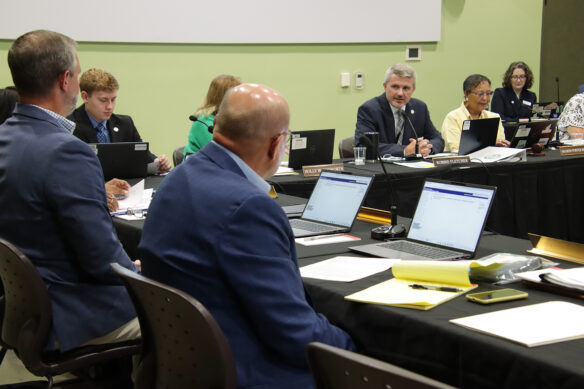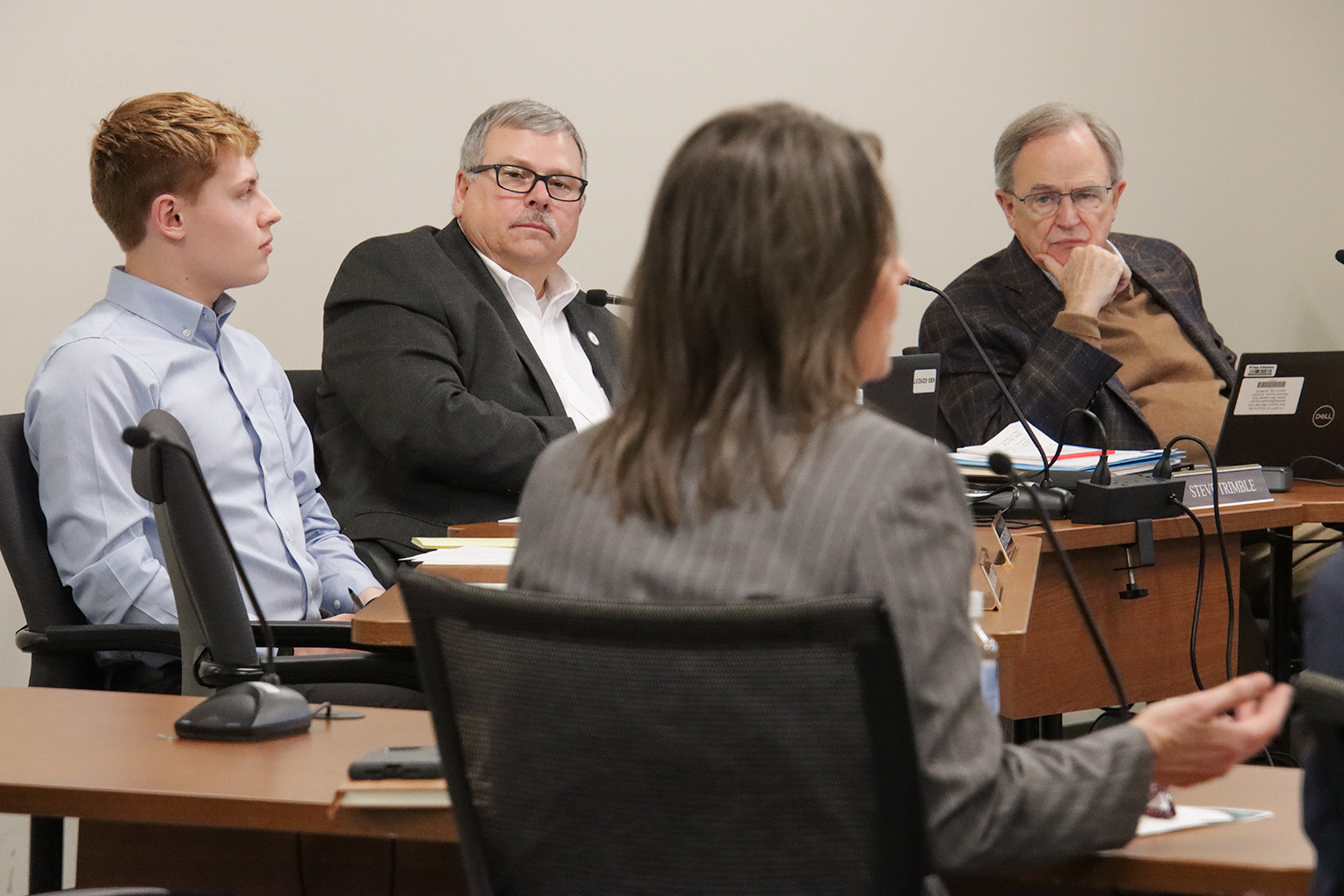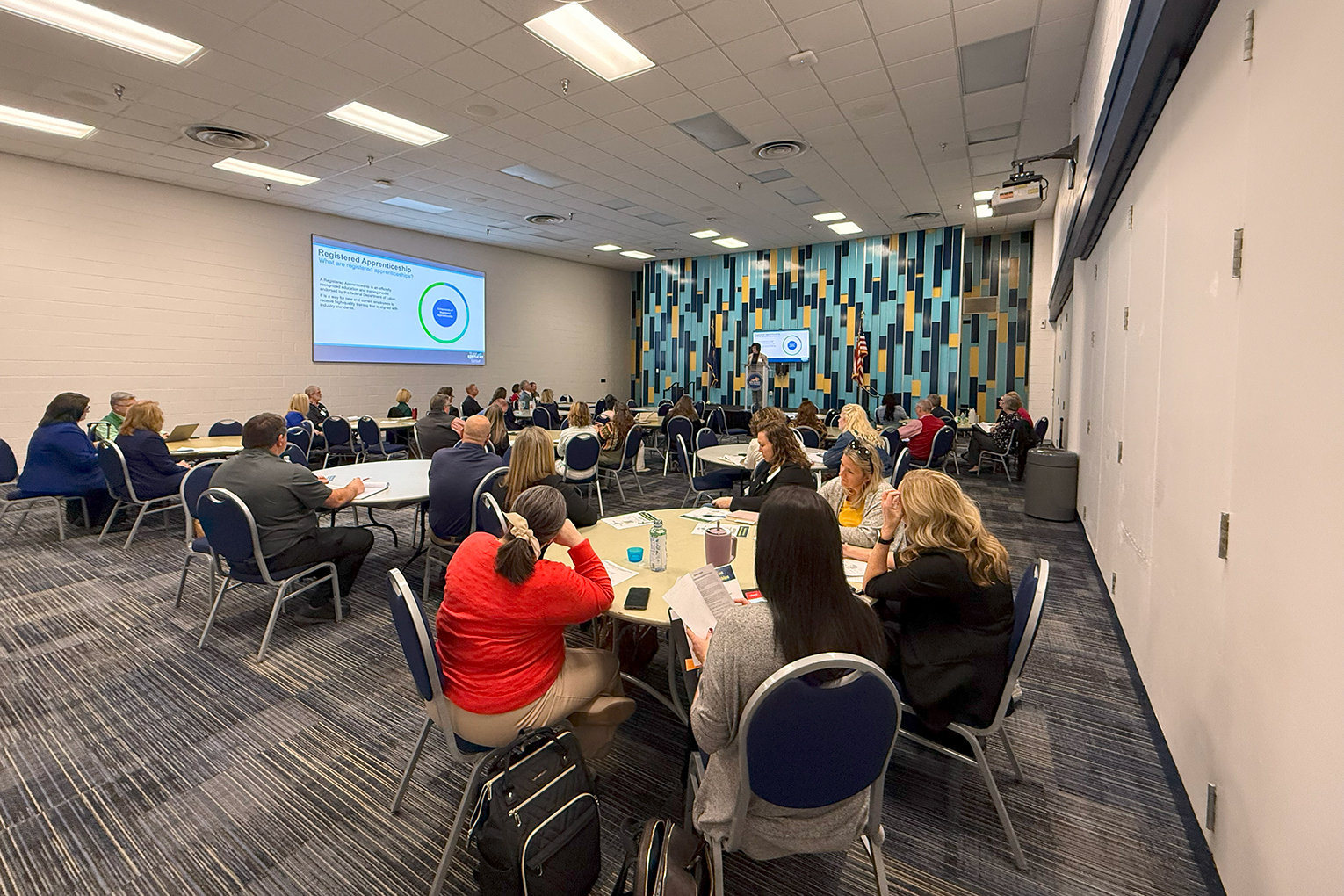
Commissioner of Education Robbie Fletcher, center, speaks with members of the Kentucky Board of Education during their meeting at Kentucky State University. Photo by Joe Ragusa, Kentucky Department of Education, Aug. 8, 2024
The Kentucky Board of Education (KBE) discussed prototypes for the Commonwealth’s assessment and accountability systems during the board’s Aug. 7-8 meeting at Kentucky State University.
The Kentucky United We Learn Council has been developing a number of prototypes that describe how Kentucky might revise its assessment and accountability systems to align with the council-adopted moonshot: “To build a prosperous Kentucky, we will launch an accountability system that is meaningful and useful to all our learners.”
Following the Kentucky United We Learn Council meeting in July, a new prototype is in development, focusing on an accreditation-style model that includes a vibrant learning experiences indicator. Schools would submit evidence to an external evaluator and the local board of education and receive ratings on rubrics with feedback for improvement.
Jennifer Stafford, director of the KDE Division of Assessment and Accountability Support, presented feedback KDE has been collecting from various advisory councils about the previous prototypes. In response to feedback from those surveys, the newest prototype is designed to reduce and streamline the current assessment and accountability system to continue meeting federal requirements and remove the state-mandated color-coded rating system currently used in the Kentucky School Report Card.
Regarding implementation, Stafford said one option could be to present changes in phases: the vibrant learning experiences indicator could be established as the state accountability system expands to include additional school quality domains. Leaders could then work toward full implementation of a state accountability system that prioritizes feedback and continuous improvement.
Commissioner of Education Robbie Fletcher said the goal of the new assessment and accountability system is to give districts the opportunity to celebrate students and also help them to improve and grow. Another goal is to make sure Kentucky’s students are competitive with other students in the global economy.
“If anything, this is taking it to a whole new level of challenging our kids, challenging our districts and challenging ourselves to give our kids the best opportunity possible,” Fletcher said.
Stafford said KDE staff members and the Kentucky United We Learn Council will enter a study phase of the latest prototype, including work with some of the Local Laboratories of Learning, before recommending an assessment and accountability to KDE leaders and later the KBE. Eventually this will lead to a proposal for the Kentucky General Assembly to consider as early as the 2026 regular legislative session.
“I know that seems like a far way away, but it’s really not. We’ve got less than 18 months at this point,” Stafford said. “We’ve got a good plan to get us there.”
Kentucky State University
Kentucky State University (KSU) hosted KBE’s annual retreat at the university’s Harold R. Benson Research and Demonstration Farm.
KSU President Koffi Akakpo spoke to the board about issues he has seen in education, including the difficulties in preparing educators for the classroom.
“The reality on the ground (for teachers) today has evolved,” he said. “Are we preparing the student to meet today’s demand?”
Akakpo said KSU has prioritized putting industry professionals in the classroom, in some fashion, to either serve as faculty or help faculty prepare students for the real world.
KBE Chair Sharon Porter Robinson said she’s excited to work with KSU as it prioritizes educator preparedness.
“We are ready to join you and support the work that you are doing at K State to build it anew and build it in the context of the requirements of practice today; not based on the romantic views of the past that perhaps still govern too many of our models,” she said.
Kentucky Education Technology System
KBE approved the 2024-2025 Kentucky Education Technology System (KETS) operational management resources to help address the KY K-12 education technology operational management needs. The funding is part of the larger KETS Master Plan for Education Technology 2024-2030.
“The education technology health of Kentucky K-12 is very good,” said David Couch, KDE associate commissioner in the Office of Education Technology. “We are the pioneer and national leader in nearly every aspect of educational technology, but we’re always looking to get better.”
Couch said there are challenges and potential issues on the horizon when it comes to education technology, however, that will require additional funding, including growing technology needs in every school district. Even with other sources of funding, the KETS Master Plan is expected to have a shortfall of potentially hundreds of millions of dollars per year.
Couch said a decrease in funding from the Kentucky General Assembly coupled with expiring COVID-19 relief funds and inflation has contributed to the problem, although his office has been working since before the pandemic to secure additional funding to meet the growing needs of districts when it comes to education technology and cybersecurity.
“We are now at a point, a crucial point, of trying to address that,” he said.
Couch said the KDE Office of Education Technology is pursuing additional money to bring KETS funding to $30 million per year to help address the shortfall. The additional budget request may be addressed during a later KBE meeting.
Online, Virtual and Remote Learning Program Procedures and Guidelines
KBE members approved amendments to Kentucky regulations on accountability administrative procedures and guidelines related to online, virtual and remote learning programs.
The proposed amendments to 703 KAR 5:240 are the result of the addition of full-time enrolled online, virtual and remote learning programs as defined by 704 KAR 3:535.
Marty Park, chief digital officer in the KDE Office of Education Technology, said the proposed amendments help modernize the administrative regulations with a structure for attributing accountability or reporting for students attending these types of programs, which is important after the establishment of 704 KAR 3:535 just two years ago.
The approved amendments to 704 KAR 3:535 require students enrolled in these programs to be primarily enrolled in an accountable school and their accountability to be attributable to that school in accordance with other accountability guidelines. Park said the amendments will continue to keep the focus on high-quality online, virtual and remote learning experiences for students throughout the Commonwealth.
In other business, the board:
- Swore in three new KBE members, as well as the new KBE non-voting teacher member;
- Approved amendments to 704 KAR 3:305, minimum requirements for high school graduation, following changes from House Bill 535 (2024) on civic literacy;
- Approved amendments to 703 KAR 5:080, the administration code for Kentucky’s educational assessment program, adjusting guidelines for test administrators to account for online testing and other proposed amendments;
- Approved amendments to 702 KAR 4:090 regarding school district property disposal; and
- Awarded the 2024 Grissom Award for Innovation in Special Education to Kentucky School for the Deaf Principal Lynn Petrey and the Purpose in Action Parker Hannifin Collaboration Team.




Leave A Comment